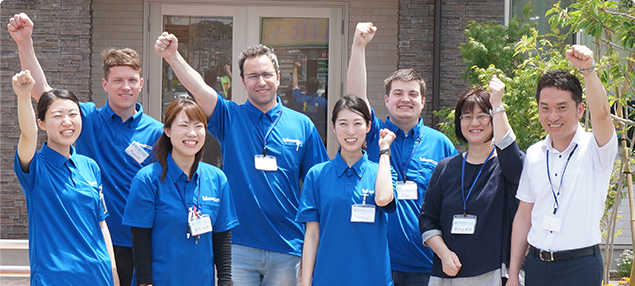Cultural meaning インクル子ども英会話浜松市
英語のブログ
インクル英会話のネイティブ先生のブログから英語を勉強しましょう。
I recently saw a video on Youtube where a man was being interviewed. The man was an American and he was being interviewed by a Japanese man. The question posed was "What should Japanese people try to avoid doing if they go to America?" A question I've seen a hundred times before in different formats with the usual comments of "Definitely be careful of this!!" or "I've lived here for 20 years and that's definitely not a thing." This video, however, was different.
In the video, the man responds to the question with "The number one thing to avoid is saying 'Thank you' and 'I'm sorry' all the time." Even the interviewer looks shocked and unthinkingly rebuts, "Those are polite though." The American concedes that it is polite but not in an intimate setting and especially not for every little thing. He gives an example about how he had a girlfriend who always said thank you and it just made him uncomfortable.
Watching the video, I agreed. That did sound uncomfortable. In America, someone who needs to hear thank you all the time isn't a very nice person, so by saying thank you all the time, it made it sound like his girlfriend didn't think he was a nice person. It implies that he didn't genuinely want to do it or enjoy doing it. I wholeheartedly sympathized.
Then I looked at the comments to find that other viewers couldn't relate. Most said that Americans are in the wrong for not saying thank you and I'm sorry enough. Some tried to understand him by rationalizing that perhaps by saying the word too often, it loses meaning like how Japanese people don't use aishiteru as often as Westerners use I love you. The most interesting comment that I found said that he didn't care; he was going to say thank you as many times as he wanted because it makes him more comfortable that way. I found this comment interesting because it got me thinking about the meaning behind thank you. If I say thank you because I want to make the person who helped me happy by showing how grateful I am, then why was this man saying thank you? If he says thank you knowing it makes the person uncomfortable only because he himself is more comfortable that way then was he even grateful toward that person in the first place? Why would you knowingly make someone you feel grateful toward uncomfortable?
This was the moment when I truly felt the difference in meaning that you can't find in a dictionary. Even if two words are the same at face value - arigatou gozaimasu and thank you - the culture and function of the word is never exactly the same. These hidden nuances are what I'm still struggling to grasp and I'm worried that I may never fully understand all the feelings and emotions behind each word.
自動翻訳
最近、ある男性がインタビューを受けているビデオを YouTube で見ました。男性はアメリカ人で、日本人男性からインタビューを受けていました。出題された質問は、「日本人がアメリカに行ったら避けるべきことは何ですか?」というものでした。これまでにさまざまな形式で何百回も見た質問で、「これには絶対に注意してください!!」というお決まりのコメントが付いています。または「ここに20年住んでいますが、そんなことは絶対にありません。」しかし、このビデオは違いました。 動画の中で男性は質問に対し、「一番避けるべきことは『ありがとう』と『ごめんなさい』を言い続けることだ」と答えている。面接官も驚いた様子で、「それは丁寧ですけどね」と思わず反論してしまう。このアメリカ人は、それが礼儀正しいことを認めているが、親密な環境ではそうではなく、特にあらゆる些細な事に対してそうではない。彼は、いつもありがとうと言ってくるガールフレンドがいて、それが彼を不快にさせたという例を挙げています。 ビデオを見て、私も同意しました。それは不快に聞こえました。アメリカでは、いつもありがとうと言わなければいけない人はあまりいい人ではないので、いつもありがとうと言うことで、ガールフレンドが彼をいい人ではないと思っているように聞こえてしまいます。それは、彼が心からそれをやりたくなかった、またはそれを楽しんでいたわけではないことを暗示しています。心から共感しました。 その後、コメントを見てみると、他の視聴者は共感できないことがわかりました。ほとんどの人は、「ありがとう」を言わなかったアメリカ人が悪いし、十分に残念だと述べた。西洋人が「I love you」を使うほど「アイシテル」を日本人が頻繁に使わないのと同じように、おそらくこの言葉を頻繁に言いすぎると意味が失われるのではないかと正当化して彼のことを理解しようとする人もいた。私が見つけた最も興味深いコメントは、彼は気にしていなかったというものでした。彼は、その方が気が楽になるので、何度でもありがとうと言うつもりでした。このコメントは、「ありがとう」の裏にある意味を考えるきっかけになり、興味深いと思いました。感謝の気持ちを表して、助けてくれた人を喜ばせたいからありがとうと言ったのなら、この人はなぜありがとうと言ったのでしょう?もし彼が、その方が相手を不快にさせることを承知でありがとうと言うのであれば、そのほうが彼自身が快適だからです。では、そもそも彼はその人に対して感謝していたのでしょうか?なぜ感謝している人を故意に不快にさせるのでしょうか? 辞書にはない意味の違いを実感した瞬間でした。 「ありがとうございます」と「Thank you」という 2 つの言葉が額面通りに同じであっても、その言葉の文化や機能はまったく同じということはありません。これらの隠されたニュアンスは、私がまだ理解するのに苦労しているものであり、それぞれの言葉の背後にあるすべての感情や感情を完全に理解することはできないのではないかと心配しています。



 テレビCM
テレビCM インクルブログ
インクルブログ カレンダー
カレンダー 英検結果
英検結果


 無料体験・お問合せ
無料体験・お問合せ 053-434-4821
053-434-4821